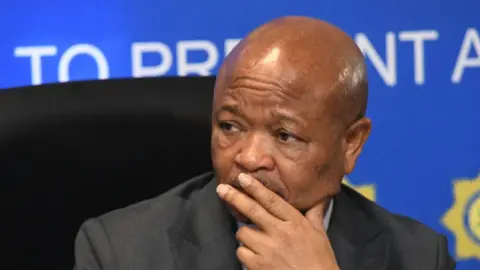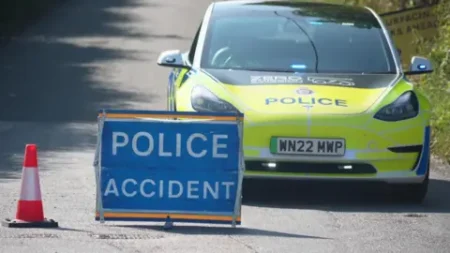In a significant political development for South Africa, President Cyril Ramaphosa has placed Police Minister Senzo Mchunu on an immediate leave of absence amid serious allegations linking him to organized crime. This decision, which commenced following a public announcement, has drawn considerable attention given the gravity of the accusations against a prominent member of Ramaphosa’s government.
The allegations, which include accusations of interference in investigations into political killings and corruption within various law enforcement agencies, have prompted Ramaphosa to initiate a judicial commission. The purpose of this commission is to conduct a thorough probe into Mchunu’s activities and any potential violations of the law that may threaten national security or undermine the integrity of the South African Constitution. Law Professor Firoz Cachalia has been appointed as the interim police minister while the investigation unfolds.
Responding to the allegations, Mchunu has firmly denied any wrongdoing. In a statement, he expressed readiness to address the accusations against him, stating his commitment to uphold the virtues of honor and integrity. The police minister’s notable stance underscores the seriousness with which he is approaching this situation, as he aims to clear his name amidst a growing scandal that has the potential to impact not only his career but also the governance of law enforcement in South Africa.
The impetus for the president’s actions ostensibly stemmed from a live televised address wherein he mentioned the urgency of these claims. The judicial commission is set to be led by the country’s Deputy Chief Justice and will scrutinize not only Mchunu but also current and former police officials, along with members of the national executive. In the context of rising public scrutiny and pressure, Ramaphosa’s decision seems partly reflective of the heightened demand from the populace for accountability within the government.
At the age of 67, Mchunu’s prominent role in the African National Congress (ANC) is well recognized, with speculation concerning his potential candidacy for a leadership position in the next ANC elective conference scheduled for 2027. His political future could be substantially influenced by the outcomes of this investigation, making the unfolding events particularly critical.
The allegations have their origins in statements made by KwaZulu-Natal’s provincial police head, General Nhlanhla Mkhwanazi. He accused Mchunu of receiving financial assistance from an alleged corrupt businessman to support his political ambitions, painting a picture of a complex web of corruption. Mkhwanazi elaborated on a purportedly orchestrated effort that led to the disbandment of a specialized task force originally created in 2018 to investigate political murders, particularly in KwaZulu-Natal. The task force had reportedly uncovered connections to influential individuals spanning various sectors, including politics, law enforcement, and business, potentially implicating a drug cartel.
As the situation develops, Mkhwanazi’s remarks reveal that 121 case files were allegedly removed from the task force’s portfolio under Mchunu’s directives, which he claims were done without the approval of the national police commissioner, General Fannie Masemola. Asserting that these dockets have remained inactive since their removal raises significant concerns about accountability and the capacity to resolve outstanding cases of political violence.
Moreover, Mkhwanazi’s claims of Mchunu’s affiliations with a controversial businessman, Vusimuzi Matlala, who previously held a lucrative police contract before facing legal troubles, add another layer to the unfolding scandal. Text message exchanges and documented payments purportedly exchanged between Mchunu and Matlala form a crucial part of the evidence being examined by the commission.
As South Africa grapples with these allegations against a high-profile official, this investigation exemplifies the ongoing challenges faced in the fight against corruption within the nation’s leadership, revealing deep-rooted issues that could redefine the very fabric of its political landscape. With implications touching both law enforcement integrity and public trust, the upcoming weeks and months will be critical in determining the outcome of these proceedings and the future of those involved.











